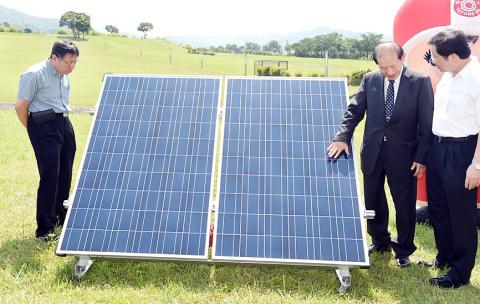Taipei is building its first solar power plant using ground-mounted solar panels at a former landfill, the city government said yesterday.
The project is part of the capital’s efforts to expand the use of renewable energy.
The Taipei Department of Environmental Protection yesterday signed a contract with Taipei-based Tatung, one of Taiwan’s leading brands for energy saving and “green” energy-related systems and services, at a ceremony at Fudekeng Environmental Restoration Park (福德坑復育公園), where the solar power plant is to be built.

Photo: Liao Chen-huei, Taipei Times
The 37 hectare park in the Muzha (木柵) area on the southeastern edge of the city used to be a landfill.
The solar power plant is expected to be completed by the end of this year and is to be able to generate up to 2 million kilowatt-hours of electricity per year, the Taipei Department of Environmental Protection said.
Speaking at the ceremony, Taipei Mayor Ko Wen-je (柯文哲) said that renewable energy sources generate about 487 million kilowatt-hours of electricity for Taipei, which accounts for only 3 percent of the city’s total power consumption.
The city is aiming to increase the contribution by renewable energy sources to 10 percent of its total power generation by the end of 2025, Ko said.
To that end, the city government is to use public land to develop solar power systems and will also subsidize the private sector to install solar power facilities to encourage wider use of solar energy, Ko said.
The new plant is expected to cut 18,905 tonnes of carbon emissions in the city annually, the department said.
The park is spacious and receives sufficient sunlight, department Commissioner Liou Ming-lone (劉銘龍) said, citing the latter as one of the reasons that it was chosen as the location for the plant.

Taiwan is stepping up plans to create self-sufficient supply chains for combat drones and increase foreign orders from the US to counter China’s numerical superiority, a defense official said on Saturday. Commenting on condition of anonymity, the official said the nation’s armed forces are in agreement with US Admiral Samuel Paparo’s assessment that Taiwan’s military must be prepared to turn the nation’s waters into a “hellscape” for the Chinese People’s Liberation Army (PLA). Paparo, the commander of the US Indo-Pacific Command, reiterated the concept during a Congressional hearing in Washington on Wednesday. He first coined the term in a security conference last

Prosecutors today declined to say who was questioned regarding alleged forgery on petitions to recall Democratic Progressive Party (DPP) legislators, after Chinese-language media earlier reported that members of the Chinese Nationalist Party (KMT) Youth League were brought in for questioning. The Ministry of Justice Investigation Bureau confirmed that two people had been questioned, but did not disclose any further information about the ongoing investigation. KMT Youth League members Lee Hsiao-liang (李孝亮) and Liu Szu-yin (劉思吟) — who are leading the effort to recall DPP caucus chief executive Rosalia Wu (吳思瑤) and Legislator Wu Pei-yi (吳沛憶) — both posted on Facebook saying: “I

Sung Chien-liang (宋建樑), who led efforts to recall Democratic Progressive Party (DPP) Legislator Lee Kun-cheng (李坤城), was released on bail of NT$80,000 today amid outcry over his decision to wear a Nazi armband to questioning the night before. Sung arrived at the New Taipei District Prosecutors’ Office for questioning in a recall petition forgery case last night wearing a red armband bearing a swastika, carrying a copy of Adolf Hitler’s Mein Kampf and giving a Nazi salute. Sung left the building at 1:15am without the armband and covering the book with his coat. Lee said today that this is a serious

A mountain blaze that broke out yesterday morning in Yangmingshan National Park was put out after five hours, following multi agency efforts involving dozens of fire trucks and helicopter water drops. The fire might have been sparked by an air quality sensor operated by the National Center for High-Performance Computing, one of the national-level laboratories under the National Applied Research Laboratories, Yangmingshan National Park Headquarters said. The Taipei City Fire Department said the fire, which broke out at about 11am yesterday near the mountainous Xiaoyoukeng (小油坑) Recreation Area was extinguished at 4:32pm. It had initially dispatched 72 personnel in four command vehicles, 16